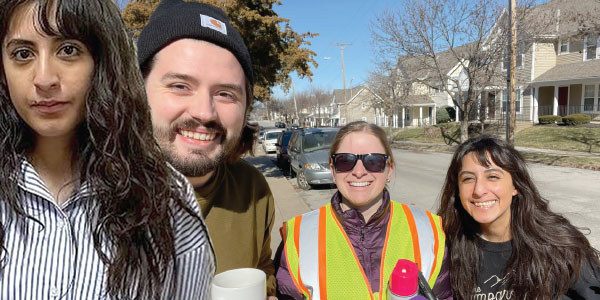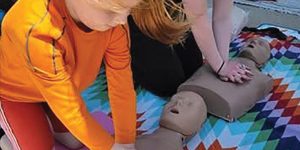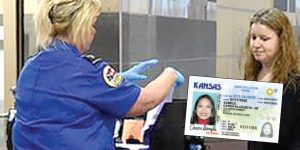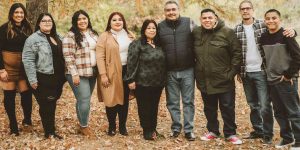
Dedicates life to helping others through work
By Angie Baldelomar
For Rebeca Amezcua-Hogan, one of the honorees by Dos Mundos for this year’s observance of Women’s History Month, advocating for those who need it has been a big part of her life.
Since her time in college, Amezcua-Hogan has volunteered for many advocacy groups and been heavily involved in those types of spaces.
“Because of my background and my parents being immigrants themselves, I’ve always stayed really true to advocating for the people that are typically left behind, for whatever reason,” she said.
It was thanks to this work that she connected with Manny Abarca, Jackson County (Missouri) legislator, and eventually became Abarca’s legislative aid. This is her second year working in that role. The work has been extremely rewarding, she said.
“It marries a lot of what I wanted to do, which is policy, and I get to help people in a more direct manner that I get to see right away,” she said.
The job also has opened Amezcua-Hogan’s eyes about the lack of resources for immigrant and refugee communities, she said.
“It was a reality check that a lot of our governmental systems are also not equipped to be helping a lot of the immigrant and refugee communities that are coming in to the country and are coming in to the city with language access (barriers),” she said.
Recently, Amezcua-Hogan worked with KC Tenants and AIR KC to get a new Office of Language Access passed through the Kansas City Council. The new office is aimed to offer services to non-English speakers.
“The goal behind all of this was that anybody that does not speak English – or English is not their first language – that they would be able to receive the same amount of equal services to a person that walks into City Hall that only speaks English,” she said.
Amezcua-Hogan has overcome her own types of barriers, including adapting to new surroundings. Her upbringing involved a lot moving. Born in Los Angeles, her parents moved her and her sister to Morelos, Mexico, where Amezcua-Hogan was raised until she was about 7 years old. Around that age, the family returned to California, starting a series of moves among California, Chicago and Kansas City. She attended three high schools.
At 18, Amezcua-Hogan settled in the Greater Kansas City area, where she attended Park University. She “fell in love” with the city, she said, and has been here since then.
Based on her experience, the advice she offers for other Latin women wanting to get into any field is to become their own cheerleader.
“You’re going to be your own source of empowerment and of advocacy, because no one else is going to do it for you,” she said. “You know for yourself why you’re doing what you’re doing and why it matters.”
Dedica su vida a ayudar a los demás a través de su trabajo
Para Rebeca Amezcua-Hogan, una de las homenajeadas por Dos Mundos por la celebración de este año del Mes de la Historia de la Mujer, defender a quienes lo necesitan ha sido una gran parte de su vida.
Desde que estaba en la universidad, se ha ofrecido como voluntaria para muchos grupos de defensa y ha estado muy involucrada en ese tipo de espacios.
“Debido a mis antecedentes y a que mis padres son inmigrantes, siempre me he mantenido fiel a la defensa de las personas que normalmente son olvidadas, por cualquier motivo”, dijo.
Fue gracias a este trabajo que conectó con Manny Abarca, legislador del condado de Jackson (Missouri), y eventualmente se convirtió en su ayuda ntelegislativa. Este es su segundo año trabajando en ese rol. El trabajo ha sido sumamente gratificante, afirmó.
“Esto combina mucho de lo que quería hacer, que es política, y puedo ayudar a la gente de una manera más directa que puedo ver de inmediato”, dijo Amezcua-Hogan.
El trabajo también le abrió los ojos sobre la falta de recursos para las comunidades de inmigrantes y refugiados, dijo.
“Fue una confirmación que muchos de nuestros sistemas gubernamentales tampoco están equipados para ayudar a muchas de las comunidades de inmigrantes y refugiados que están llegando al país y a la ciudad con (barreras) de acceso lingüístico”, dijo,
Recientemente, Amezcua-Hogan trabajó con KC Tenants y AIR KC para lograr que el Concejo Municipal de Kansas aprobara una nueva Oficina de Acceso Lingüístico. La nueva oficina tiene como objetivo ofrecer servicios a personas que no hablan inglés.
“El objetivo detrás de todo esto era que cualquier persona que no hable inglés – o que el inglés no sea su primer idioma – pueda recibir la misma cantidad de servicios que los que recibe una persona que ingresa al Ayuntamiento y solo habla inglés”, explicó.
Amezcua-Hogan ha superado sus propios tipos de barreras, incluida la adaptación a nuevos entornos. Su educación implicó muchas mudanzas. Nacida en Los Ángeles, sus padres la trasladaron a ella y a su hermana a Morelos, México, donde se crió hasta los 7 años. Alrededor de esa edad, la familia regresó a California, iniciando una serie de mudanzas entre California, Chicago y Kansas City. Asistió a tres escuelas secundarias.
A los 18 años, Amezcua-Hogan se instaló en el área metropolitana de Kansas City, donde asistió a Park University. Ella “se enamoró” de la ciudad, dijo, y ha estado aquí desde entonces.
Según su experiencia, el consejo que Amezcua-Hogan ofrece a otras mujeres latinas que quieran incursionar en cualquier campo es que se conviertan en sus propias animadoras.
“Vas a ser tu propia fuente de empoderamiento y de defensa, porque nadie más lo hará por ti”, dijo. “Sabes por ti mismo por qué haces lo que haces y por qué es importante”.









